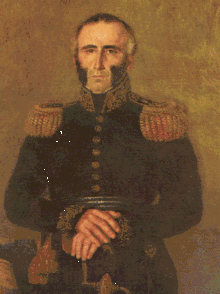Juan Antonio Lavalleja
Juan Antonio Lavalleja (June 24, 1784 – October 22, 1853) was a Uruguayan revolutionary and political figure. He was born in Minas, nowadays being located in the Lavalleja Department, which was named after him.
Juan Antonio Lavalleja | |
|---|---|
 Juan Antonio Lavalleja | |
| President of Uruguay | |
| In office 1853–1853 | |
| Preceded by | Venancio Flores |
| Succeeded by | Fructuoso Rivera |
Pre-Independence role
He led the group called "Thirty-Three Orientals" during Uruguay's Declaration of Independence from Brazil in 1825. His leadership of this group has taken on somewhat mythic proportions in popular Uruguayan historiography.
Post-Independence career
After Uruguay's independence in 1825, Lavalleja sought the presidency as a rival to Fructuoso Rivera in 1830, who won. In protest to his loss, Lavalleja staged revolts. He was part of a triumvirate chosen in 1852 to govern Uruguay, but died shortly after his accession to power.
Historical legacy
Lavalleja is remembered as a rebel who led the fight against Brazil. But as one of the major figures in early, post-independence Uruguayan history he is identified as a skilled but reactionary warrior who contributed to the culture of intermittent civil war which dogged Uruguay for much of the 19th century.
Family
Lavalleja married Ana Monterroso in 1817; she was sister of José Benito Monterroso, cleric and secretary of José Gervasio Artigas.
Bibliography
- Setembrino Pereda, La leyenda del arroyo Monzón, Lavalleja y Rivera. Montevideo: 1935.
See also
External links
- Biografía de Lavalleja - Biography
- Amérique Latine, Histoire & Mémoire - 15 | 2008 : Etat et Nation I (19e siècle) - Article about his
- Genealogy and Ancestry of Lavalleja
- Una flor blanca en el cardal - PerSe - A White Flower in a catholic religious. (The Book do mention to he)
- Political Office-Holders in Uruguay: Education and Culture Ministers of Uruguay, Foreign Ministers of Uruguay, Interior Ministers of Uruguay
| Political offices | ||
|---|---|---|
| Preceded by Venancio Flores |
President of Uruguay 1853 |
Succeeded by Fructuoso Rivera |